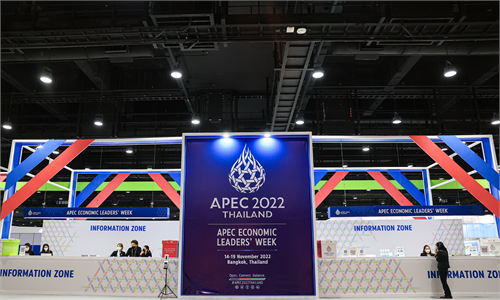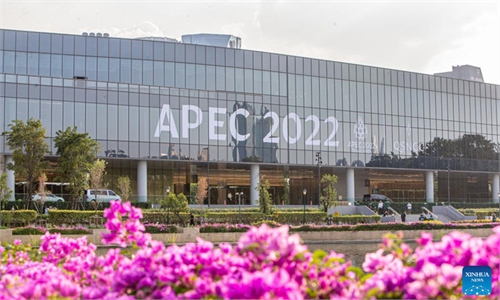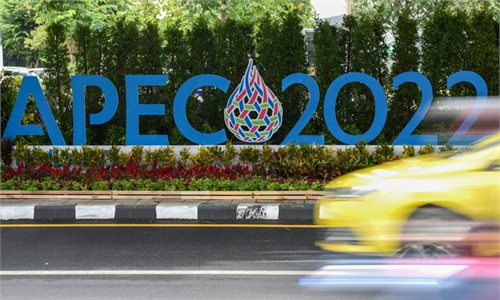Xi announces 3rd Belt & Road forum to be held in 2023, calls on Asia-Pacific to up cooperation to new height
Chinese President Xi Jinping is welcomed by Thai Prime Minister Prayut Chan-o-cha, at the venue for the APEC Economic Leaders' Meeting in Bangkok on November 18, 2022. Photo: Xinhua
Addressing the APEC Economic Leaders' Meeting in Bangkok, Thailand on Friday, Chinese President Xi Jinping commended economic cooperation in the Asia-Pacific over the past several decades that has led to an "Asia-Pacific miracle," and called for the joint building of an Asia-Pacific community with a shared future and taking Asia-Pacific cooperation to a new height.
He also announced that Beijing is to consider holding the third Belt and Road Forum for International Cooperation next year to give a new boost to development and prosperity in Asia-Pacific and the wider world.
The Chinese president's remarks at the first in-person APEC economic leaders' meeting in four years offered a vigorous rebuttal to increasing attempts by certain economies and other forces to actively instigate tension within the region and seriously undermine regional cooperation. They also provided much-needed relief for regional economies that are becoming increasingly uneasy over growing tensions, Asia-Pacific business representatives and analysts noted.
At the APEC Economic Leaders' Meeting and other related events in Bangkok, many attendees also drew a stark contrast between China's growing leadership role and the US' diminishing presence. Some observers noted China's clear-cut stance on Asia-Pacific cooperation and concrete actions in advancing regional peace and development, while suggesting that the US' repeatedly reaffirmed commitment looks more like "empty talk" during times of hardship.
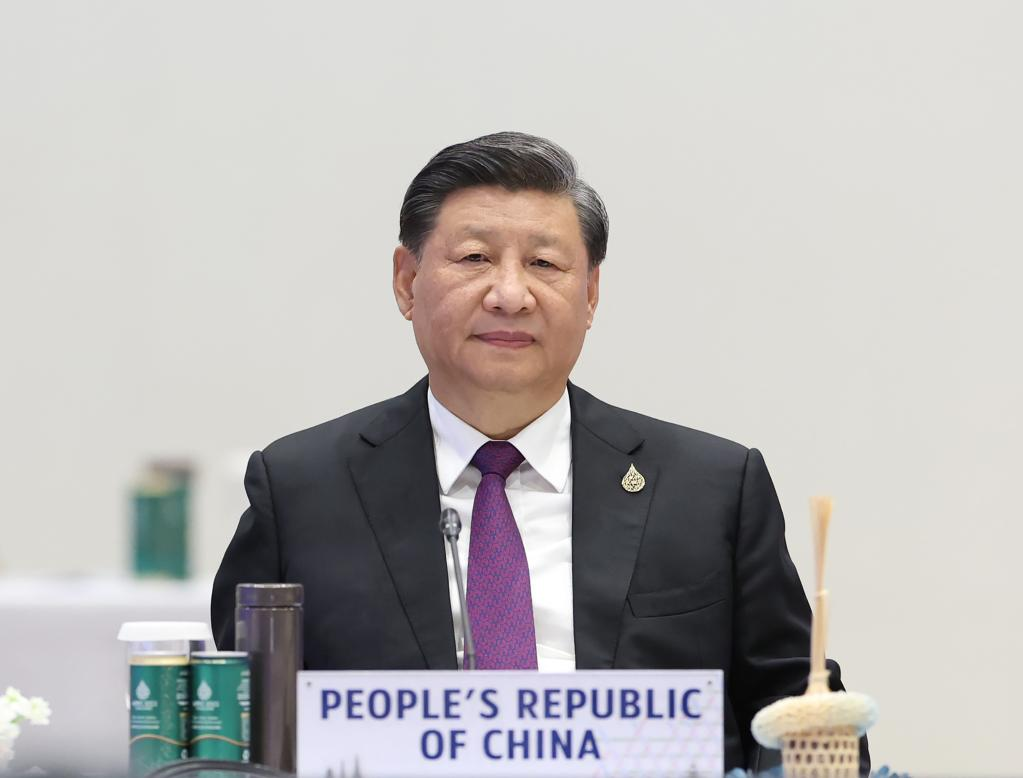
Chinese President Xi Jinping delivers a speech titled "Shouldering Responsibility and Working Together in Solidarity to Build an Asia-Pacific Community with a Shared Future" at the 29th Asia-Pacific Economic Cooperation (APEC) Economic Leaders' Meeting in Bangkok, Thailand, Nov 18, 2022. Photo:Xinhua
China's vision
After arriving at the grand and modern Queen Sirikit National Convention Center in downtown Bangkok, where the theme of Asia-Pacific cooperation is ubiquitous, on Friday morning, Xi told APEC leaders that "the Asia-Pacific is our home as well as the powerhouse of global economic growth. Over the past decades, robust economic cooperation in the region has created the 'Asia-Pacific miracle' admired across the world. Asia-Pacific cooperation has taken deep root in the hearts of the people."
Noting that the world has come to another historical crossroads, Xi called for joining hands to build an Asia-Pacific community with a shared future and taking Asia-Pacific cooperation to a new height.
The Chinese president made four specific proposals -upholding international fairness and justice and building an Asia-Pacific of peace and stability, staying committed to openness and inclusiveness and bringing about prosperity for all in the Asia-Pacific, striving for green and low-carbon development and ensuring a clean and beautiful Asia-Pacific, and bearing in mind the shared future and make the Asia-Pacific a region where all are ready to help each other.
Xi also stressed the need to make sure that development is for the people and by the people, and that its fruits are shared among the people, calling for efforts to promote prosperity for all in the Asia-Pacific.
China will work with other parties on the full and high-quality implementation of the Regional Comprehensive Economic Partnership (RCEP), and continue working toward joining the Comprehensive and Progressive Agreement for Trans-Pacific Partnership (CPTPP) and the Digital Economy Partnership Agreement (DEPA), for the purpose of promoting integrated development of the region.
China will consider holding the third Belt and Road Forum for International Cooperation next year to provide fresh impetus for the development and prosperity of the Asia-Pacific and the world, Xi said.
Li Haidong, a professor from the Institute of International Relations at the China Foreign Affairs University, told the Global Times that next year's forum will lead to a more economically interconnected world, and the China-proposed BRI will help "bury regional divisions and confrontations" and bring lasting world peace and prosperity, as the most important thing for the current global economy is to maintain the economic integration process and prevent a reversal of globalization through the forming of small economic cliques by some Western countries.
He said as next year will mark the 10th anniversary of the BRI, the forum is expected to make new plans for the world to better use the BRI to promote the building of a community with a shared future for mankind, and contribute to the changing international landscape that is at a critical transition period.
"The Asia-Pacific economy is at a crucial period of post-COVID recovery, and turmoil and changes in international politics and economies pose a serious challenge for Asia-Pacific development. President Xi showed us that peaceful development and win-win cooperation is the mainstream for the Asia-Pacific's future development," Wirun Phichaiwongphakdee, director of the Thailand-China Research Center of the Belt and Road Initiative, told the Global Times on Friday.
Phichaiwongphakdee said that the Chinese president's call for building closer regional industrial and supply chains is a very important aspect of Asia-Pacific cooperation, which will help the region cope with risks and ensure stability and prosperity.
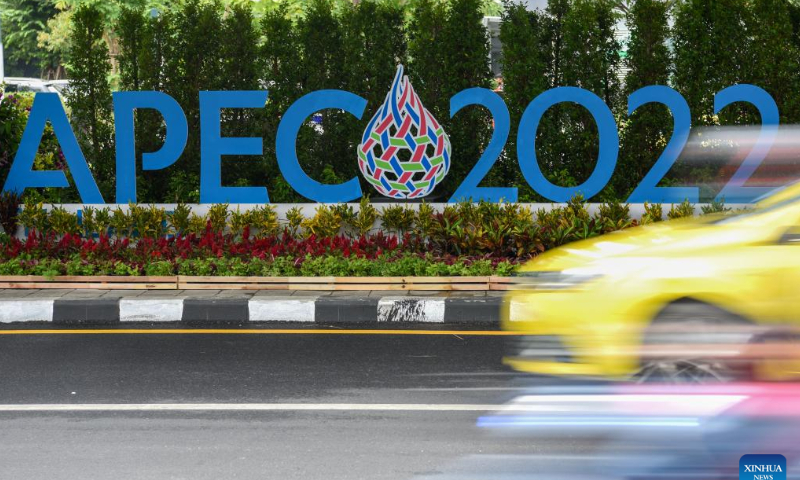
This photo taken on Nov 14, 2022 shows a logo of APEC 2022 in Bangkok, Thailand. The 29th Asia-Pacific Economic Cooperation (APEC) Economic Leaders' Meeting will be held in Bangkok, Thailand, on Nov 18-19. Photo: Xinhua
US 'empty talk'
As has been the case in many multilateral events, the presence of China and the US also drew close attention and comparisons at the APEC Economic Leaders' Meeting in Bangkok.
Even before the meeting started, many raised questions about the US' commitment to Asia-Pacific cooperation, as US President Joe Biden skipped the meeting and sent Vice President Kamala Harris to Bangkok instead.
During a speech at the APEC meeting on Friday, Harris pledged further economic commitment to the Asia-Pacific region. "The US is here to stay. Strengthening our economic relationships in the region and partnering with the private sector is a top priority for the US," Harris said.
However, for many in the region who have been following the US' words and deeds closely since the COVID-19 pandemic as well as the US' geopolitical gambits to instigate tension in the region, such commitments look increasingly like "empty talk."
"The West's words about so-called equality among countries and commitment to Southeast Asia are, in my personal view as a Thai national, just talk. When you really face difficult times, they will not reach out to help you at all, so we Thai people now have a deep understanding of this. And our real friend is China," said Phichaiwongphakdee.
The US' disruptions to regional cooperation are being felt particularly strongly by many businesses in the region, even though the business community tries hard to steer clear of politics.
At the venue for the APEC leader's meeting, where many regional companies set up booths to promote their products and services, business representatives are quick to point out the vast potential for regional cooperation. However, when asked about risks and challenges, they are also quick to point out geopolitical tensions, particularly those in the Taiwan Straits.
"If tensions escalate into conflict, the regional economy will fall and so will the global economy," a business representative from a major industrial firm that operates in many Southeast Asian countries and cooperates with Chinese firms, told the Global Times on the sidelines of the APEC leaders' meeting.
The business representative, who requested anonymity, said that the "economics of industrial cooperation in the region is already there," and what is needed to boost such cooperation is a political "trigger" from occasions like APEC.
Such concerns are not limited to businesses but were also underscored by regional and world leaders at the APEC leaders' meeting on Friday, where many stopped short of directly denouncing certain countries' geopolitical agenda of roping in regional countries into its containment strategy of China, but repeatedly warned against tensions and called for cooperation.
Focus on cooperation
In Friday's speech, Xi stressed China will advance a broader agenda of opening up across more areas and in greater depth, follow the Chinese path to modernization, and put in place new systems for a higher-standard open economy.
China will continue to share its development opportunities with the world, particularly with the Asia-Pacific region, the Chinese president said.
Prime Minister Prayut Chan-o-cha of Thailand, the host of the APEC leaders' meeting, said Friday that countries must change their practices to overcome challenges posed by the pandemic, climate change and geopolitical divisions.
"We can no longer live like we did. We need to adjust our perspective, ways of life and ways of doing business," Prayut said.
As the host of the APEC leaders' meeting, Thailand has set the theme as "Open, Connect and Balanced", aiming to shape the discussions around regional open trade and investment, restoring connectivity and balanced and sustainable development.
That theme has been echoed by many regional and world leaders, as the Asia-Pacific economy, despite being the most vibrant in the world, also faces a slew of challenges, including global inflation, food, energy and debt crises, disrupted industrial and supply chains as well as geopolitical tensions.
Despite growing warnings against rising geopolitical tensions in the region, US officials appeared committed not to regional cooperation but to regional division at the APEC leaders' meeting, by bringing various geopolitical issues there.
US Secretary of State Antony Blinken said on Thursday that addressing the Russia-Ukraine conflict is a key focus of APEC.
But such attempts to hijack the meeting in order to focus on its own geopolitical agenda were not very successful, as many regional as well as world leaders were focused on cooperation.
Attending the meeting as a guest, French President Emmanuel Macron also said at the APEC CEO Summit that a new equilibrium and stability at the regional level is needed to avoid new conflicts, noting that the US' trade war against China "has put a lot of countries in a situation to choose. Are you on the US or the China side?... But we need a single global order."
Regional observers said that as many countries, increasingly worried about economic crises, and focus on cooperation, China's vision for a community of shared future will take deeper root in the Asia-Pacific as opposed to the US' vision for division among different blocs.
"[China's] people-centered thinking has been felt by not only the Thai people in terms of vaccine supplies, but also people around the world. And that is something real that the people of the world can see about the community with a shared future for mankind," Phichaiwongphakdee said.

